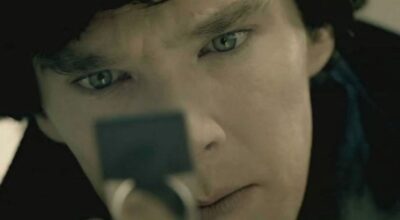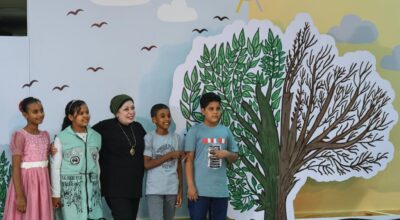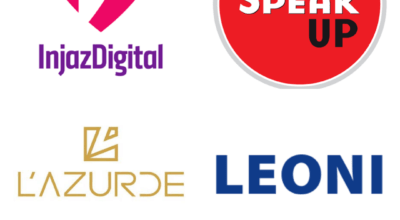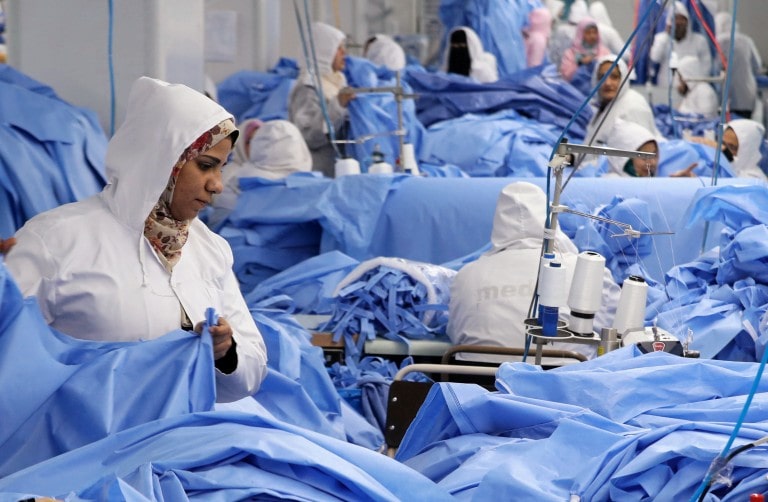Anxiety amongst the Egyptian public about Covid restrictions has quickly dissipated following the easing of the restrictive social distancing measures imposed over Eid. In fact, many were surprised about the imposition of restrictions in May to begin with, believing that doing so was overly cautious. This relaxed perception of the progression of Covid is reflected by public reluctance to adopt prevention measures. Moving around lots of areas of the city, the lack of masks worn and social distancing would seem to indicate no existence of the virus at all.
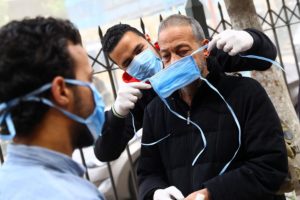
Photo Via: Xinhua Net, Ahmed Gomaa
Nonetheless, in light of newly released statistics showing that there have been more deaths from Covid during the first six months of 2021 than there were for the entirety of 2020, it seems clear that we’re not out of the woods yet.
One group that has never had the privilege of denying the dark realities of Covid is doctors. In fact, the Middle East Monitor revealed that amongst the rise of infections in Egypt in mid-April, 50 doctors died of Covid during a two-week period. By May 4th, the official number of doctor deaths reached 500.
These statistics reflect the dissonance in experience between the doctors in Egypt that fight Covid every day, and the members of the public who have, fortunately, remained largely unaffected by the virus.
To address this gap in understanding, the 925 team sought out doctors across Cairo and invited them to share their stories with our audience. We were privileged to speak with three medics: a Cardiologist from the National Heart Institute, and a Pulmonologist and Gastroenterologist from Kasr Al-Ainy Hospital
During these interviews, these doctors shared their experiences within the ward and discussed what has changed over the past year, their most challenging personal moments, and their hopes for the future.
What has changed since the beginning of the pandemic
Thankfully, in general, the doctors spoke about their increased understanding of, and therefore confidence in treating the virus. “I think we are a bit more relaxed. At first, I think healthcare workers, in general, felt responsible for facing this end of the world scenario head-on, we didn’t know what exactly we were doing. There were no previous experiences, there were no studies. Now we are – kind of – more relaxed.” the Cardiologist, Dr. Khaled (not this real name), shared.
However, each doctor stressed that this relaxation in treating patients is only relative to the panic and desperation they had felt when the pandemic began. The Pulmonologist, Dr. Seif (again, not his real name) was quick to remind us that the medical community still doesn’t know enough. There’s still neither a cure nor reliable treatment. The Gastroenterologist, Dr. Farida (not her real name), described her fear and despair when the pandemic began in March 2020, and her feelings as she said goodbye to her family before heading into the isolation hospital. She reminded us that no healthcare worker had an idea of when they might see their families again, and compared walking into the ward for the first time to “stepping onto a battlefield.”
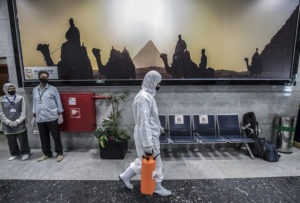
A worker disinfecting Hurghada Airport during the beginning of Covid in 2020. Photo Via: Arab News
In this sense, the doctors were quick to warn against letting our gradual relaxation drift into complacency. As time has gone on, the heady combination of frustration with restrictions and acclimatization to the constant threat of the virus has, according to Dr. Seif, manifested as outright carelessness in Cairo. He spoke about the fact that many people have either already recovered from a previous infection, and have therefore convinced themselves they will be able to do so again, or they claim that they are careful enough around their families to not pass the virus along. By this reasoning, people seem to consider a Covid infection an inevitability that they make little effort to avoid – even by just wearing a mask. Dr. Seif interpreted the shared mentality of much of the Egyptian public “I’m just going to go live my life, and if I get it then I get it. That’s it, that’s my destiny.” As a result, many feel justified in the continuation of ordinary life, as though the virus no longer exists. Dr. Seif recounted many conversations with friends about their decision to go to large, crowded parties in Cairo. When he questions his friend’s decision to attend, he said that he is often met with the same answer:
‘But it’s going to be outdoors!’
“250 people?”
‘Man, it’s going to be outdoors, no worries!’
According to the doctors, this carelessness and lack of consideration for others are indicative of a much wider problem amongst community members in Egypt.
People don’t care about the virus until it affects them personally
This intentional disregard for the virus manifests in a refusal to take the necessary preventative precautions that protect the wider public. Unsurprisingly, however, this nonchalance entirely disappears when a family member or close friend is infected. Dr. Seif, in particular, spoke on the dark and humorless irony of watching concerned family members care for patients after having passed on the virus through their attendance of large super-spreader events, “People just really don’t care about Covid… Except when it hits one of their families – one member of their family. Then you see your father or mother in the ICU, and then they start to care. That’s not a solution.”

Weddings with large parties and still being celebrated in Egypt. Photo Via: Arabia Weddings
This is especially difficult for doctors to deal with, having seen so much tragedy firsthand
Although all the doctors agreed that each death is impactful, they shared the story of the most memorable patients they had lost that year. Dr. Seif spoke about a man that he had treated in a specialized transplant hospital during his time in Paris. As policy dictates, the patient was tested before he entered the hospital for his routine procedure. The patient was initially negative when he entered the hospital. However, two days into his stay, he began to develop a high fever.
“He had what we call a nosocomial infection – like, he caught Covid from the hospital. Unfortunately, it went really badly. He was a really nice guy but he passed away a few weeks later. But I thought – “Wow, you came for a minor thing. You didn’t even have Covid at the beginning.””
This patient’s infection progressed quickly, Dr. Seif explained, because the patient was on immuno-suppressants to facilitate their body’s acceptance of the life-saving transplanted organ. For other doctors, the difficulty of treating their patients was due to the nature of their relationship. Dr. Khaled shared his story about caring for his former professor upon his admittance into the hospital. Dr. Khaled immediately knew how challenging treating an authority figure would be: “It was difficult on a personal level to see someone you’ve always looked up to…someone powerful… to see him in a sick, lonely state.”
The professor stayed within the ICU for two weeks, and the healthcare team made the difficult decision to exaggerate his recovery – telling him that every day he was improving, even though he hadn’t. The team hoped that this would give him a boost of optimism that would facilitate his treatment, Dr. Khaled continued: “Actually, every day that passed, he wasn’t really doing any worse. But, the lack of improvement meant that his lungs had…irreversible damage.” Dr. Khaled spoke about the painful experience of knowing that the professor wasn’t improving and watching him slowly deteriorate whilst spending time with him so that he wasn’t alone. During this period, they formed a close relationship: “My mistake was getting too attached on an emotional level… the man, at this time of weakness – I was the closest thing he had to a family member. He treated me like a son, we got so attached in that time period, spending no less than six hours a day together in the ICU. Even behind masks, even behind face shields… still.”
Inevitably, however, the professor’s condition began to worsen. Throughout, Dr. Khaled said, the professor kept his hope and optimism and continued to pray every day. This was particularly admirable as the professor continued to watch others in the ICU crash one by one and suddenly pass away. Dr. Khaled concluded sadly “One day, he crashed. Just like everyone else. In a matter of minutes, he was gone. It shook us. It shook me and my colleagues […] We knew this was the inevitable outcome […] each and every one of us prayed on time that it wouldn’t happen when he was on duty, that he wouldn’t have to witness that event himself.”
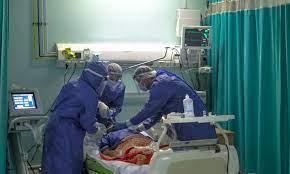
Despite their best efforts, doctors still face distrust and occasional abuse from their patients’ families
According to Dr. Seif, the combination of incidents of abuse in the ICU, doctors’ prolonged separation from their families, and constant stress has caused many to quit. They spoke about this rising pattern with concern and empathy: “when you tell them [patients] you don’t have a space in the ICU, you don’t have a bed for them, or his father – he will react innately by attacking the person who is telling him that he can’t help you. He thinks that you can find him a bed […] that’s why doctors don’t feel safe.”
Each of the doctors empathized with the fears of patients trying to care for their family members, of course, but they expressed frustration that most of the Egyptian public has not been exposed to the uniquely horrendous realities of the Covid ICU.
So what is a Covid ICU actually like?
Dealing with unexpected, and extremely rapid, deterioration of patients.
Each of the doctors spoke at length about how the Covid ICU atmosphere is markedly different from anything they had ever experienced before. Firstly, the nature of the virus is such that the patient deterioration is quick, and often completely unexpected. Dr. Seif emphasized this during a story about treating a family friend. This patient died within 24 hours of seeking medical attention at the hospital. Most alarmingly, none of the patient’s vitals appeared to be at all concerning until the last moment. He concluded sadly: “It showed me what this wicked virus can do. It’s not like the flu, it showed me what can happen.”
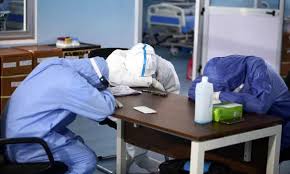
Photo Via: The Guardian
This pattern of unpredictable and rapid deterioration of patients has had a damaging cumulative effect on the teams working in the wards. Not only are the teams never able to relax – even when their patient is stable – but also they are never emotionally prepared for their patient’s death. Dr. Khaled spoke about how this makes each loss of a patient all the more shocking and damaging: “the way Covid turns around in a matter of 24 or 48 hours. A patient you think is doing fine, he’s handling it well, you think that he’s on his way to recovery. Suddenly, in the blink of an eye, his whole life turns upside down. He becomes severely hypoxic – as in, short of oxygen – he struggles to breathe, needs to be put on a mechanical ventilator and sometimes they can die.”
Over the past year, these sudden deaths have had a cumulative effect on the doctors fighting the virus. Dr. Khaled sadly concluded:
Each and every one of these cases leaves a mark on the physician and the healthcare team in general.
Unfortunately, this pattern only seems to be worsening with the introduction of new strains from South Africa, India, Brazil, and the UK. Despite people feeling more relaxed about the transmission of the virus, Dr. Farida warned that since the first wave, the cases have become more aggressive, have proven more difficult to treat, and often involve speedy deterioration.
The psychological conditions for patients
According to our doctors, staying in the Covid ICU presents a unique strain on the psychological and emotional health of patients that is largely absent outside of the pandemic. Aside from the obvious unpleasant loneliness that forced isolation creates for patients and doctors alike, additional factors crucially affect both patient experience and doctors’ morale. In particular, Dr. Khaled spoke about the “psychological trauma” of patients watching others with the same diagnosis as their own deteriorate: “The Covid ICU is a nightmare to the patient really. If it’s a nightmare to the doctor, it’s ten times more to a patient […] Knowing you share this diagnosis and then seeing the other patients around you fall, one by one, collapsing around you, being ventilated, being sedated, crashing, and eventually passing away… is a very cruel burden to carry […] What if I’m next? What if this happens to me? “

Photo Via: Egypt Independent
The extreme conditions of the ICU are one of the many reasons why doctors are so enthusiastic to get the population vaccinated as quickly as possible, and so frustrated with vaccine hesitancy. The reluctance to get vaccinated, according to Dr. Seif, is largely due to a lack of research or access to reliable sources. As a result, people are far more likely to heed unsubstantiated rumors they hear from friends or read on social media: “There are a lot of people who can take the vaccine and they refuse just because they didn’t do enough research: ‘We don’t know about the vaccine, we don’t want to know! It might affect our children!’ I don’t think it’s…what can I say? It aches doctors.”
Dr. Seif continues to explain that such people justify their decision to avoid vaccination by arguing that they are too careful to spread the disease. However, Dr. Seif counters, due to the nature of the virus, one can never be sure they aren’t contributing to transmission. He states: “You don’t have to be selfish and think ‘I don’t see people, I don’t see my parents,’ You are a part of the population, you have to protect yourself and protect others because you don’t know how you might get it and when.”
Therefore, whilst doctors respect an individual’s decision to refuse vaccination, they argue that in making such a decision, the person should be obliged to continue in total isolation – to eliminate the possibility of infecting others. Moreover, should one choose to refuse a vaccination due to information they have found online, they ask that people refrain from sharing the material if they are unsure of the reliability of the source. This tangent introduced the issue of the spread of misinformation, and how it has undermined the fight against Covid.
Misinformation and Social Media
“What bothers doctors and medical personnel is people read a lot on the internet […] We hear a lot of ‘I read in an article, a friend told me, I’ve heard on WhatsApp, someone sent me a message…’ all of this creates a negative environment […] Misinformation spread by social media is a huge issue, yes. Mostly through social media,” Dr. Seif decisively shared.
According to these doctors, what is most concerning about the circulation of misinformation is that it aims to undermine the efficacy and safety of vaccinations. The spread of this scaremongering material has only become more dangerous, according to Dr. Khaled, due to the variants that are sweeping Brazil, India, South Africa, and the UK. Explicitly, every person who is infected with the virus provides it with another chance to mutate. These mutations are how new variants are created, which can become deadlier, or even vaccine-resistant. If people get the vaccination now, it denies the virus the opportunity to infect them and potentially mutate in such a harmful way. Dr. Khaled added What we don’t know is whether the virus will once again take one step again of us, become resistant to the vaccine – then we’ll fall back to square one.
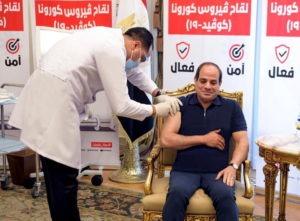
President al-Sisi receiving a vaccine on 25th April, 2021. Photo Via: Reuters
“The light at the end of the tunnel”
Overall, the improved treatment methods of Covid and the vaccination have given the doctors hope – each one spoke about seeing “a light at the end of the tunnel.” Although life may never be the same for those who have lost loved ones, and we can only guess when, exactly, the end might be, it certainly exists. Dr. Khaled argued, however, that we can and should not measure the ‘end’ of the pandemic simply by the end of infections. Rather, it will take the community a much longer time to psychologically recover from the harms of the previous year.
In this sense, whilst medical professionals remain sympathetic to the fatigue of following social distancing precautions, they were quick to remind us that the more compliant we are with the regulations, the faster the pandemic will be over. In their closing statements, therefore, the resounding message was:
Hang on a little while longer. There is a light at the end of the tunnel. At least, this is not the end of the world […] it’s not! Humanity has survived worse pandemics in the past, we will survive this one. We have more knowledge than ever, we have more technology than ever, we have more means of communication for sharing this information. Get vaccinated! […] we only need to keep fighting for a little while longer and then we will hopefully be through all of this, and we will have quite a story to tell! To tell our kids, to tell our grandkids. We can tell them anything we want, tell them we survived the end of the world, literally.


